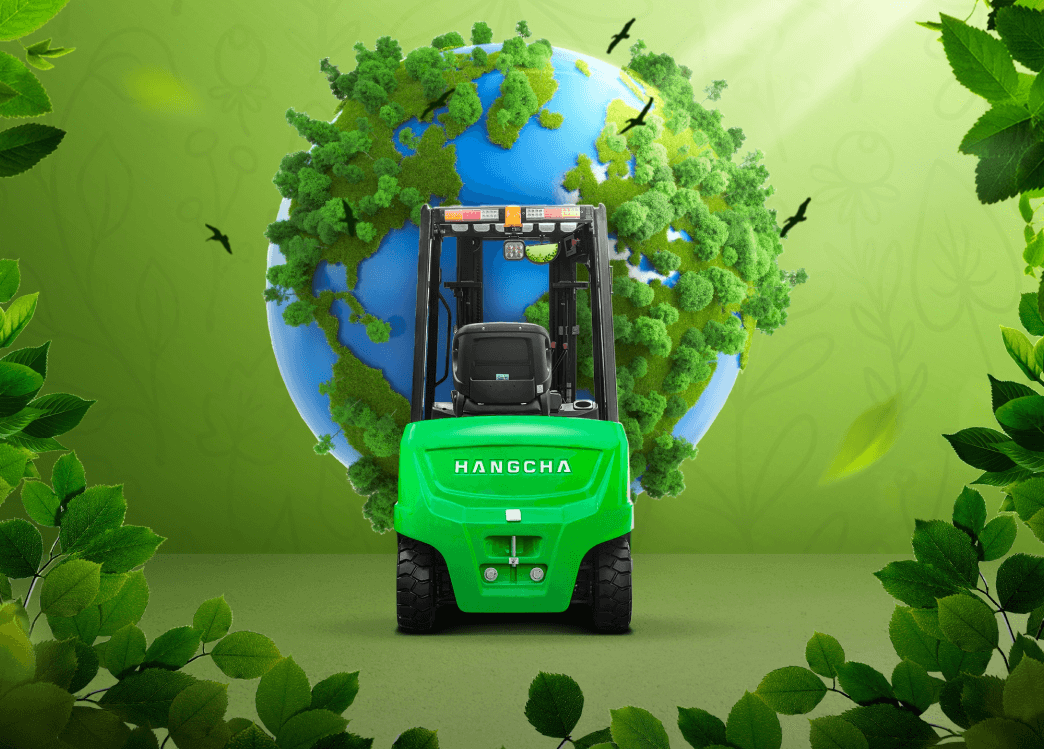Jak technologia Li-ion wpływa na zrównoważony rozwój w przemyśle logistycznym?

W dobie rosnącej świadomości ekologicznej i dążenia do zrównoważonego rozwoju, przemysł logistyczny musi adaptować nowe technologie, które pozwolą zmniejszyć jego negatywny wpływ na środowisko. Jednym z kluczowych rozwiązań jest wykorzystanie technologii Li-ion (litowo-jonowych) w wózkach widłowych. W tym artykule przyjrzymy się, jak technologia Li-ion przyczynia się do zrównoważonego rozwoju w logistyce oraz jakie korzyści niesie dla przedsiębiorstw i środowiska.
Technologia Li-ion, znana głównie z zastosowań w elektronice konsumenckiej, zyskuje coraz większe uznanie w przemyśle logistycznym. Baterie Li-ion charakteryzują się wysoką gęstością energii, długą żywotnością i krótkim czasem ładowania, co czyni je idealnym wyborem dla wózków widłowych i innych urządzeń magazynowych. Więcej informacji na temat tej technologii znajdziesz TUTAJ.
Korzyści dla środowiska wynikające z technologii Li-ion
1. Redukcja emisji CO2
Wózki widłowe napędzane silnikami spalinowymi emitują znaczące ilości dwutlenku węgla (CO2) oraz innych szkodliwych substancji, takich jak tlenki azotu (NOx) i cząstki stałe (PM). Przejście na wózki zasilane bateriami Li-ion znacząco redukuje emisję tych zanieczyszczeń, przyczyniając się do poprawy jakości powietrza. Dzięki zerowej emisji podczas pracy, wózki Li-ion są bardziej przyjazne dla środowiska i mogą być używane w zamkniętych pomieszczeniach bez ryzyka dla zdrowia pracowników.
2. Efektywność energetyczna
Baterie litowo-jonowe są znacznie bardziej efektywne energetycznie niż tradycyjne akumulatory kwasowo-ołowiowe. Oznacza to, że mniej energii jest tracone podczas ładowania i rozładowywania baterii. Dzięki wyższej gęstości energii, baterie Li-ion mogą magazynować więcej energii w mniejszej objętości, co prowadzi do mniejszego zużycia energii elektrycznej na ładowanie. To z kolei zmniejsza zapotrzebowanie na energię wytwarzaną z paliw kopalnych, co pomaga w redukcji emisji gazów cieplarnianych.
3. Mniejsze zużycie zasobów
Dłuższa żywotność baterii Li-ion w porównaniu do baterii kwasowo-ołowiowych oznacza, że są one wymieniane rzadziej. Baterie Li-ion mogą wytrzymać nawet do 2-3 razy więcej cykli ładowania niż ich tradycyjne odpowiedniki. Mniejsza częstotliwość wymiany baterii zmniejsza zapotrzebowanie na surowce niezbędne do produkcji nowych baterii, takie jak ołów, który jest toksyczny i trudny do utylizacji. Ponadto, baterie Li-ion są bardziej efektywne w recyklingu, co minimalizuje ich wpływ na środowisko po zakończeniu okresu eksploatacji.
4. Redukcja hałasu
Wózki widłowe zasilane bateriami Li-ion są znacznie cichsze niż ich odpowiedniki napędzane silnikami spalinowymi. Mniejszy poziom hałasu przyczynia się do poprawy warunków pracy w magazynach i centrach logistycznych, co ma pozytywny wpływ na zdrowie i samopoczucie pracowników. Mniejszy hałas oznacza również mniejsze zakłócenia dla otaczającej społeczności, co jest szczególnie istotne w przypadku obiektów logistycznych znajdujących się w pobliżu terenów mieszkalnych.
5. Brak ryzyka zanieczyszczenia kwasami
W przeciwieństwie do baterii kwasowo-ołowiowych, baterie Li-ion nie zawierają kwasu, co eliminuje ryzyko wycieków i zanieczyszczenia środowiska. Wyciek kwasu z baterii kwasowo-ołowiowych może prowadzić do poważnych szkód dla środowiska oraz stwarza zagrożenie dla zdrowia pracowników. Baterie Li-ion są bardziej bezpieczne w eksploatacji i łatwiejsze w obsłudze, co dodatkowo zwiększa ich atrakcyjność jako ekologicznego rozwiązania.
Korzyści ekonomiczne dla przedsiębiorstw
1. Oszczędności operacyjne
Wózki widłowe zasilane bateriami Li-ion wymagają znacznie mniej konserwacji w porównaniu do tych zasilanych bateriami kwasowo-ołowiowymi. Brak konieczności regularnego uzupełniania elektrolitu oraz mniejsze ryzyko wycieków i korozji oznacza, że potrzeba mniej przestojów na serwisowanie. Ponadto, dłuższa żywotność baterii Li-ion redukuje częstotliwość ich wymiany, co z kolei obniża koszty zakupu i utylizacji starych baterii. Wszystko to przyczynia się do znaczących oszczędności operacyjnych.
2. Krótszy czas ładowania
Baterie Li-ion charakteryzują się znacznie krótszym czasem ładowania w porównaniu do tradycyjnych baterii kwasowo-ołowiowych. W praktyce oznacza to, że wózki widłowe mogą wrócić do pracy szybciej, minimalizując przestoje i zwiększając dostępność sprzętu. Wózki widłowe mogą być ładowane w krótkich przerwach między operacjami, co eliminuje potrzebę posiadania dodatkowych wózków na zmianę i obniża koszty związane z utrzymaniem większej floty.
3. Wysoka wydajność
Baterie Li-ion utrzymują stałą wydajność przez cały cykl pracy, w przeciwieństwie do baterii kwasowo-ołowiowych, które z czasem tracą moc. Oznacza to, że wózki widłowe zasilane bateriami Li-ion mogą działać na pełnej mocy przez dłuższy czas, co przekłada się na wyższą produktywność. Stała wydajność operacyjna pozwala również na bardziej precyzyjne planowanie i realizację zadań logistycznych, co z kolei przekłada się na lepszą organizację pracy i wyższe zyski.
4. Dłuższa żywotność baterii
Baterie Li-ion mają znacznie dłuższą żywotność niż baterie kwasowo-ołowiowe, co oznacza, że ich wymiana jest rzadsza. To nie tylko zmniejsza koszty zakupu nowych baterii, ale również redukuje koszty związane z recyklingiem i utylizacją starych baterii. Dłuższa żywotność baterii zmniejsza także czas przestojów związanych z wymianą i konserwacją, co ma bezpośredni wpływ na zwiększenie efektywności operacyjnej.
5. Redukcja kosztów infrastruktury ładowania
Wózki widłowe z bateriami Li-ion nie wymagają specjalnych pomieszczeń do ładowania z wentylacją, jak ma to miejsce w przypadku baterii kwasowo-ołowiowych. Oznacza to, że firmy mogą zaoszczędzić na kosztach budowy i utrzymania dedykowanych stacji ładowania. Dodatkowo, brak konieczności posiadania wielu zestawów wymiennych baterii zmniejsza zapotrzebowanie na przestrzeń magazynową i związane z nią koszty.
6. Elastyczność operacyjna
Dzięki możliwości szybkiego ładowania i braku konieczności długotrwałych przestojów na konserwację, wózki widłowe z bateriami Li-ion oferują większą elastyczność operacyjną. Firmy mogą lepiej dostosowywać swoje zasoby do zmieniających się potrzeb logistycznych, co pozwala na bardziej efektywne zarządzanie flotą i redukcję kosztów operacyjnych.
Jak wdrożyć technologię Li-ion w swojej firmie?
1. Analiza potrzeb
Przed wdrożeniem technologii Li-ion warto przeprowadzić dokładną analizę potrzeb swojej firmy. Ocena aktualnego parku maszynowego, zużycia energii oraz kosztów operacyjnych pozwoli określić, jakie korzyści przyniesie przejście na baterie Li-ion.
2. Wybór odpowiednich dostawców
Kluczowym elementem udanego wdrożenia technologii Li-ion jest wybór odpowiednich dostawców baterii i wózków widłowych. Warto zwrócić uwagę na renomę producenta, oferowane wsparcie techniczne oraz dostępność serwisu.
3. Szkolenie pracowników
Wprowadzenie nowej technologii wymaga przeszkolenia personelu. Szkolenia powinny obejmować obsługę i konserwację baterii Li-ion, a także procedury bezpieczeństwa związane z ich użytkowaniem.
Podsumowanie
Technologia Li-ion to przyszłość zrównoważonego rozwoju w przemyśle logistycznym. Dzięki niej możliwe jest znaczne ograniczenie emisji CO2, poprawa efektywności energetycznej oraz redukcja kosztów operacyjnych. Wdrożenie tej technologii przynosi korzyści zarówno środowiskowe, jak i ekonomiczne, co sprawia, że jest to rozwiązanie godne rozważenia przez każdą firmę działającą w branży logistycznej.
Przyjmując technologię Li-ion, przedsiębiorstwa mogą nie tylko zredukować swój ślad węglowy, ale także zwiększyć swoją konkurencyjność na rynku poprzez bardziej efektywne i ekologiczne operacje.




